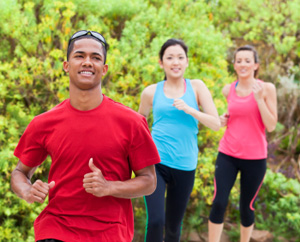Penn Herb Wellness Guide
Teen Athletes: Tips for Staying Cool, Hydrated, and Safe in the Heat

- Ease up if needed
In 2011, The American Academy of Pediatrics (AAP) issued a policy statement about kids, teens, heat, and exercise, announcing that, contrary to previous thought, young bodies are as resilient and equipped to tolerate exertion in hot weather as adults.
This is great news, but not a license to push hard or engage in long exercise in high heat. According to the research underlying the policy statement, when heat-related illnesses do occur in kids and teens, there are some common underlying conditions that lead to the problems, including
- lack of recovery time between workouts,
- closely scheduled same-day training sessions, often referred to as “double days,”
- wearing clothing or protective gear that results in over-heating,
- the presence of a chronic health condition in a teen that reduces heat tolerance, such as diabetes, obesity, juvenile hyperthyroidism (Graves’ disease), cystic fibrosis, and sickle cell anemia, and
- using medications that can affect hydration, such as those used to treat attention-deficit/hyperactivity disorder (dopamine-reuptake inhibitors) and asthma, gastritis, ulcerative colitis, cystitis, and insomnia (anticholinergic drugs).
If your teen has a chronic health condition or is taking medication, check with your doctor about how this might affect his or her ability to exercise in the heat.
- Hydrate well
One of the most important things you can do to stay safe when exercising in the heat—and this is true for teens and adults alike—is to get plenty of fluids. The following tips can help you stay hydrated:
- Water yourself. If you’re exercising less than an hour, plain water is fine.
- Try electrolytes. If you’re working out for longer periods, or if it’s your second work out of the day (think “double days”), use a hydration drink that contains electrolytes.
- Stay consistent. Sip 1 to 2 cups of fluid in the hour prior to starting your activity, and sip one-half to one cup of fluid throughout your workout, especially if you’re sweating a lot.
- Fight monsters. Before working out, avoid energy drinks that contain caffeine and other herbs that are designed to give you a “kick.” The excess caffeine can be dehydrating, and these products can mask fatigue, causing a person to push harder than is safe in the high heat.
- Know your coaching staff, use common sense
Another important piece of the puzzle is working out with qualified coaches and trainers. Make sure your coaches and other adults on-site have had training for safely working with young athletes in the heat. Your mom and dad already may have figured this one out.
- Educate yourself. Know the signs of heat exhaustion—excessive thirst, weakness, and headache if you’re low on water—nausea, vomiting, muscle cramps, and dizziness if you need electrolytes.
- Be prepared. Drink plenty of fluids before, during, and after exercise.
- Rest up. Be sure to take at least a two-hour break between workouts or matches and games in hot weather.
- Check it out. For parents, make sure the coaching staff has an emergency action plan to deal with heat-related illnesses.
- Be smart. If you’ve been sick recently, with a cold, flu, or other illness, let your coach know, and limit your activities until you feel 100%.
- Walk away. If anyone on your coaching staff denies you or other kids water during a workout or pushes someone past reasonable limits when they are clearly having trouble, don’t participate. It might feel hard, and you may feel like you’ll get in trouble, but letting your parents know fluids are being denied will keep you, and your friends, safe from the dangers of extreme dehydration.
Copyright 2025 TraceGains, Inc. All rights reserved.


